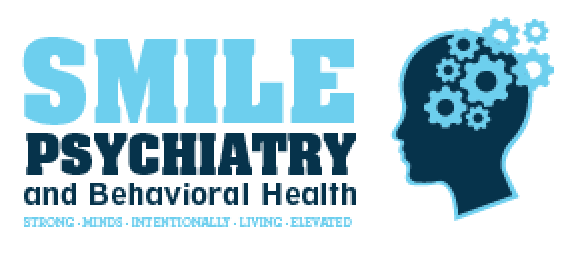Comprehensive Anxiety Treatment for a Balanced Life & Mind
At Smile Psychiatry & Behavioral Health, we believe in personalized, compassionate therapy to help you overcome anxiety and regain control of your life. Book an appointment today!
Compassionate Treatment for Adults in Utah


Mental health is intimidating. As an adult, you may find it hard to admit or even consider the possibility that you are experiencing anxiety. There are more important things to worry about, you might say. Maybe you’re taking care of little ones at home or working extra hours in the office. Maybe you feel like you’re not allowed to need help. Maybe it’s taken you months or even years to recognize that anxiety has taken hold of your life. Maybe all you know is that you want to feel peace again–the kind of peace you haven’t felt in a long time.
If anxiety is interfering with your performance, your life, or your happiness, we have the tools and the experience to help you start feeling like yourself again. Pass the torch of stress, frustration, and despair to us, and let us do what we do best: take care of you. Book an in-person or telehealth appointment today to start treating your anxiety and taking control of your life.
What is Anxiety?
At healthy levels, anxiety is a very normal and even necessary emotion. Anxiety is the brain’s way of protecting you. When you encounter stress or danger, the brain sends signals throughout your body that allow you to think quicker and act faster. This happens all the time in our daily lives–at work when you have a big meeting, on the road when someone unexpectedly cuts you off, and even at home when relationships are tense. Sometimes, anxiety is helpful–it can help you think outside the box, react quickly to danger, and have more energy and ideas. But sometimes, something goes wrong. Due to prolonged environmental stress, the chemistry of the brain, and other factors, anxiety levels can increase to an extent that is unhelpful and even unmanageable. This is called an anxiety disorder.
Do you feel as if you are in a constant state of stress? Do you find it hard to remember the last time you felt calm? Do you have trouble sleeping or relaxing because your mind is racing? Are you struggling to maintain relationships or perform your best at work? Are your worries, fears, or intrusive thoughts taking over the things you love? If you answered yes to any of these questions, you may benefit from anxiety therapy.
What Are the Symptoms of Anxiety?
Anxiety is a universal experience, but everyone experiences it differently. While some people may feel that anxiety sits in their stomach, others may notice that it weighs on their shoulders or buzzes in their head. Here are some of the most commonly reported symptoms of anxiety:
- Restlessness
- Trouble concentrating
- Trouble sleeping
- Repetitive or intrusive thoughts
- Excessive worry or stress
- Muscle tension
- Headaches
- Nausea
- Heart palpitations
- Sweating
- Dizziness
How Do You Know If You Have Anxiety?
If you are experiencing any of the above symptoms, or if some of the scenarios described resonate with you, an anxiety diagnosis could be your next step to taking control of your life, your mental health, and your happiness. Even if you’re not sure that your anxiety levels are extreme enough to afford a diagnosis, speaking to a professional will allow you to pinpoint what you’re experiencing and how best to manage your symptoms and make a change.
The process of getting diagnosed with anxiety begins with a consultation with your primary care physician. Your doctor will help you rule out any other conditions that may be causing your anxiety. If there are no other health conditions or medications contributing to your anxiety levels, your doctor will refer you to a psychologist to evaluate you. This evaluation will include a detailed medical history and a discussion of your symptoms, after which you will return for a feedback session. Your evaluator will then present your diagnosis and help you make a treatment plan for the future, which may include therapy, medication, or an alternative solution.
What Are the Different Types of Anxiety?
Generalized Anxiety Disorder (GAD)
Generalized anxiety disorder (GAD) is characterized by exaggerated worry about everyday tasks and challenges. Some of the most common symptoms of generalized anxiety include restlessness, trouble sleeping, and difficulty concentrating.
Social Anxiety Disorder
Social anxiety disorder is characterized by anxious thoughts about social perception that are disproportionate to the situation. This can look like practicing what you’re going to say before a phone call to avoid embarrassment, replaying social interactions in your mind, or micromanaging your expressions to avoid judgment.
Panic Disorder
Panic disorder is a type of anxiety that involves panic attacks–sudden, intense bursts of anxiety that may resemble a heart attack. Panic attacks may manifest through sweating, heart palpitations, dizziness, chest pain, trembling, and nausea.
Obsessive Compulsive Disorder (OCD)
Obsessive-compulsive disorder, though no longer considered an anxiety disorder, shares a lot of symptoms with generalized anxiety disorder: intrusive thoughts, exaggerated worry, and various physical symptoms, such as restlessness and trouble concentrating. The key difference between OCD and other types of anxiety is the compulsions.
How Does Anxiety Treatment Help?


As mentioned above, anxiety is a normal and healthy emotion. It’s only when anxiety levels increase to an unmanageable level, due to a chemical imbalance in the brain or prolonged exposure to a stressful environment, that anxiety becomes a hindrance rather than a help in daily life. This is when therapy can help.
Therapists are medical professionals who have been educated about the way anxiety interacts with the brain and trained in how to interrupt and reshape anxious thought patterns. Therapists can listen to you and notice where your thinking errors and intrusive thoughts are popping up, teach you to notice them, and provide you with the skills to challenge or redirect them. Your therapist will give you the tools to manage your symptoms, process and let go of distressing thoughts, and reach a level of stability and peace that you have been without for a long time.
At Smile Psychiatry, we understand that the world won’t stop spinning for you. Life goes on, and most people–especially professionals and adults with bills to pay, mouths to feed, and endless to-do lists–can’t dedicate countless hours to mental health treatment. That’s why we specialize in personalized, holistic treatment plans that will allow you to treat your anxiety while maintaining, prioritizing, and improving your lifestyle. If work is important to you, it’s important to us, and our therapists will help you implement the changes and techniques that will improve your performance and satisfaction in the workplace as well as in your personal life. No matter what your priorities are, we possess the expertise and the compassion to help you in exactly the ways you need.
How Does Medication Help With Anxiety?
Sometimes anxiety arises due to the brain’s genetic or structural disposition, and sometimes external stressors can trigger an anxiety disorder. Whatever the case, therapy can help you manage symptoms–but it may not be enough on its own. Anxiety medication stimulates certain calming chemicals in your brain, allowing you to reach a level of tranquility at which you will be more receptive to new information, which will make therapy more effective for you. If you’re finding it difficult to manage your distress and anxiety, even with proper coping mechanisms, medication could be exactly the boost you need to crest the hill in your journey to taking control of your life.
Looking for Help With Anxiety?
Getting help doesn’t make you weak. It makes you strong. Anxiety disorders can affect anyone, but they are especially debilitating for adults and professionals with responsibilities, expectations, and little to no time to spare. It’s normal to feel hesitant about accepting help, especially if you’ve spent your whole life being independent, self-reliant, and the source of help for others. But you deserve to feel whole again.
You deserve to feel the passion, peace, and hope you once did, and you deserve to get the help that will allow you to maintain your relationships, perform your best at work and at home, and be happy with your life. Don’t let anxiety get in the way of living a life you love.
See What Our Patients Have To Say...
Bruno was awesome! Good advice on proper treatment. He also connected with me over my faith (Church of Jesus Christ of Latter-day Saints), which is important to me when meeting with mental health professionals.
-Harrison
Bruno Silvia is amazing! He answered any question[s] and concern[s] I had.:)
-Aspen S.
Dr Barrett is so caring an professional, I was in bad shape going into see him and I found him to be compassionate and understanding. I would recommend him to anyone seeking help.
-Ben S
